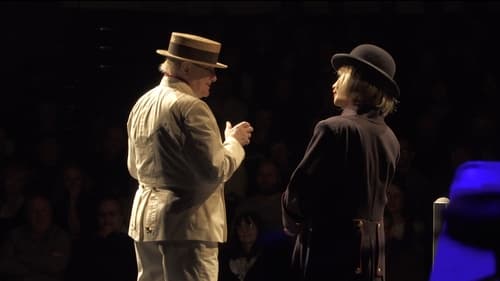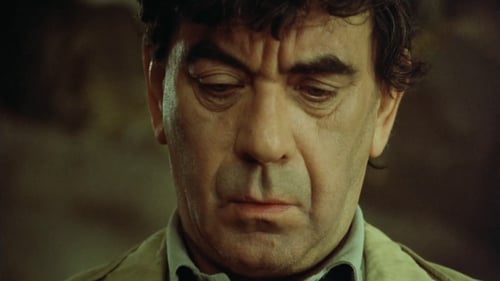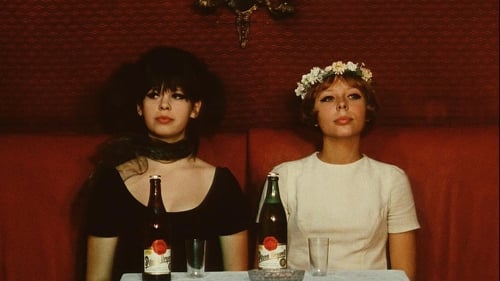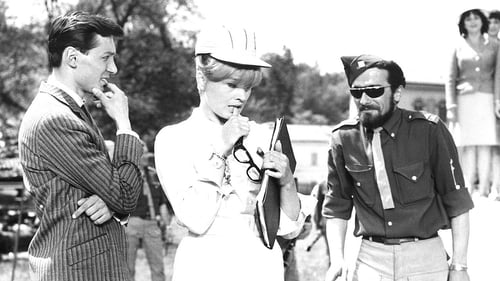Jiří Suchý
Рождение : 1931-10-01, Plzeň, Československo

Self

Screenplay

Himself
Theatre personality, musician, poet, writer, graphic artist, collector, self-professed clown, eternally young in spirit – all this is Jiří Suchý, one of the key figures of the domestic cultural scene over the last six decades. He has put on 97 plays at the Semafor theatre and has written the lyrics for 1,400 songs and the music for 500. Today, in an era beset by an onslaught of images that are often of questionable worth, this legendary figure’s tireless efforts to enrich the Czech language and its poetic nuances have been of inestimable value. Olga Sommerová lays before us Suchý’s prolific creative and civic journey through life with the subtle distinctiveness we have come to expect; she also demonstrates her singular flair for capturing exceptional moments.

Self

Music

Postman
The young couple Uli and Vanilla want to split up, but lust and money get in their way.

Screenplay
The young couple Uli and Vanilla want to split up, but lust and money get in their way.

Историю Фауста, человека, который продал душу нечистому, представляет выдающийся чешский мультипликатор Ян Шванкмайер. Он превращает всем известный миф о Фаусте в сюрреалистическую смесь анимации и гиперреализма, в которой действуют живые актеры, глиняные куклы и гигантские марионетки. Герой Шванкмайера блуждает по узким улочкам Праги с мистической картой в руках. Лабиринты улиц приводят его на заброшенный чердак, где он находит старинный кукольный театр и «Фауста» Гете посередине комнаты. Он примеряет костюм Фауста и вживается в его образ. Начавшись как невинная забава, его путешествие превратилось в реальность, и герой очутился в лаборатории знаменитого алхимика…

(uncredited)
This distinctive documentary portrait of Prague extolls the beauty, significance and spirit of the ancient city adopting modern way of life. The form and content of the film share a common underlining principle. The author doesn't simply list out the sequence of events, but rather approaches them in a broader context of their historic implications and circumstances. The content of the film covers a large period from the pagan times to these days. The facts are grouped under several general headings (paganry, the spread of Christianity, renaissance, baroq and modern times) with allusions to the modern life of Prague and Praguers that has its roots in those times.

Musician

Lyricist
The female employees of the poultry-processing factory find relief from their monotonous work in chatting about weddings and marriages. The very young Zdena (Marta Vancurová), too, dreams about a white veil and an entourage of bridesmaids. On her return home from work, she runs into a peculiar man on an abandoned road who pertinaciously offers to read her palm for a few crowns to buy soup. His augury is rather usual - wealth and poverty, suffering and happiness. Then however, he declares that Zdena must marry exactly on 3 November of that year otherwise she will be unhappy.

Story
The female employees of the poultry-processing factory find relief from their monotonous work in chatting about weddings and marriages. The very young Zdena (Marta Vancurová), too, dreams about a white veil and an entourage of bridesmaids. On her return home from work, she runs into a peculiar man on an abandoned road who pertinaciously offers to read her palm for a few crowns to buy soup. His augury is rather usual - wealth and poverty, suffering and happiness. Then however, he declares that Zdena must marry exactly on 3 November of that year otherwise she will be unhappy.

Screenplay
The female employees of the poultry-processing factory find relief from their monotonous work in chatting about weddings and marriages. The very young Zdena (Marta Vancurová), too, dreams about a white veil and an entourage of bridesmaids. On her return home from work, she runs into a peculiar man on an abandoned road who pertinaciously offers to read her palm for a few crowns to buy soup. His augury is rather usual - wealth and poverty, suffering and happiness. Then however, he declares that Zdena must marry exactly on 3 November of that year otherwise she will be unhappy.

Director
The female employees of the poultry-processing factory find relief from their monotonous work in chatting about weddings and marriages. The very young Zdena (Marta Vancurová), too, dreams about a white veil and an entourage of bridesmaids. On her return home from work, she runs into a peculiar man on an abandoned road who pertinaciously offers to read her palm for a few crowns to buy soup. His augury is rather usual - wealth and poverty, suffering and happiness. Then however, he declares that Zdena must marry exactly on 3 November of that year otherwise she will be unhappy.

Screenplay
A black comedy set in a Prague cabaret.

Pepiček
A black comedy set in a Prague cabaret.

Lyricist
Две девушки, обе по имени Мария, решают, что так как мир испорчен, они будут испорчены также. И стараются вести себя как можно хуже. Выходки девушек становятся столь экстравагантными, что пугают их самих.

Dobře placená procházka (English title: Worth While or A Well Paid Walk) is a Czech musical and film.

Theatre Play
Dobře placená procházka (English title: Worth While or A Well Paid Walk) is a Czech musical and film.

Self
In 1965, during eminent trumpeter Louis Armstrong’s visit to Prague, Jan Spata then a young promising documentary filmmaker, created the report 'Hallo Satchmo'.

Lyricist
В военном гарнизоне Алкалис в день открытия памятника Иоганну Себастьяну Баху разворачиваются загадочные события. Солдат Шульц, прекрасный кларнетист, дезертирует из гарнизона при помощи молодого учителя и И.С.Баха. В тот момент, когда Шульцу угрожает опасность, ружья, направленные на него, превращаются в кларнеты. Все оружие в гарнизоне становится музыкальными инструментами. Церемония открытия памятника великому композитору превращается в музыкальное шоу.

Theatre Play
В военном гарнизоне Алкалис в день открытия памятника Иоганну Себастьяну Баху разворачиваются загадочные события. Солдат Шульц, прекрасный кларнетист, дезертирует из гарнизона при помощи молодого учителя и И.С.Баха. В тот момент, когда Шульцу угрожает опасность, ружья, направленные на него, превращаются в кларнеты. Все оружие в гарнизоне становится музыкальными инструментами. Церемония открытия памятника великому композитору превращается в музыкальное шоу.

Screenplay
В военном гарнизоне Алкалис в день открытия памятника Иоганну Себастьяну Баху разворачиваются загадочные события. Солдат Шульц, прекрасный кларнетист, дезертирует из гарнизона при помощи молодого учителя и И.С.Баха. В тот момент, когда Шульцу угрожает опасность, ружья, направленные на него, превращаются в кларнеты. Все оружие в гарнизоне становится музыкальными инструментами. Церемония открытия памятника великому композитору превращается в музыкальное шоу.

parašutista
В военном гарнизоне Алкалис в день открытия памятника Иоганну Себастьяну Баху разворачиваются загадочные события. Солдат Шульц, прекрасный кларнетист, дезертирует из гарнизона при помощи молодого учителя и И.С.Баха. В тот момент, когда Шульцу угрожает опасность, ружья, направленные на него, превращаются в кларнеты. Все оружие в гарнизоне становится музыкальными инструментами. Церемония открытия памятника великому композитору превращается в музыкальное шоу.

Screenplay

Jiří Suchý

Original Music Composer
Two closely related episodes. Youths make problems for two local orchestras about to compete nationally, and in a talent competition a young girl gets stage fright, while another lies to her boss to compete.

Self (segment "Konkurs")
Two closely related episodes. Youths make problems for two local orchestras about to compete nationally, and in a talent competition a young girl gets stage fright, while another lies to her boss to compete.

Theatre Play

Writer

Theatre Play

Lyricist
Еще в молодости актер Франтишек Лукавец и его преподаватель Владимир Тума стали врагами. Франтишек настоял на том, чтобы Туму как реакционера и враждебно относящегося к новой власти уволили из училища. Прошло много лет, и вот они вновь встретились на сцене одного театра. Франтишеку поручена роль Юлиуса Фучика, Тума в этом же спектакле играет роль гестаповца. По ходу действия гестаповец бьет Фучика. Воспользовавшись случаем, Тума на генеральной репетиции по настоящему избивает своего давнего врага. По лицу Франтишека течет кровь, но он все равно будет играть. Репетиция продолжается...

Lyricist

Lyricist

















